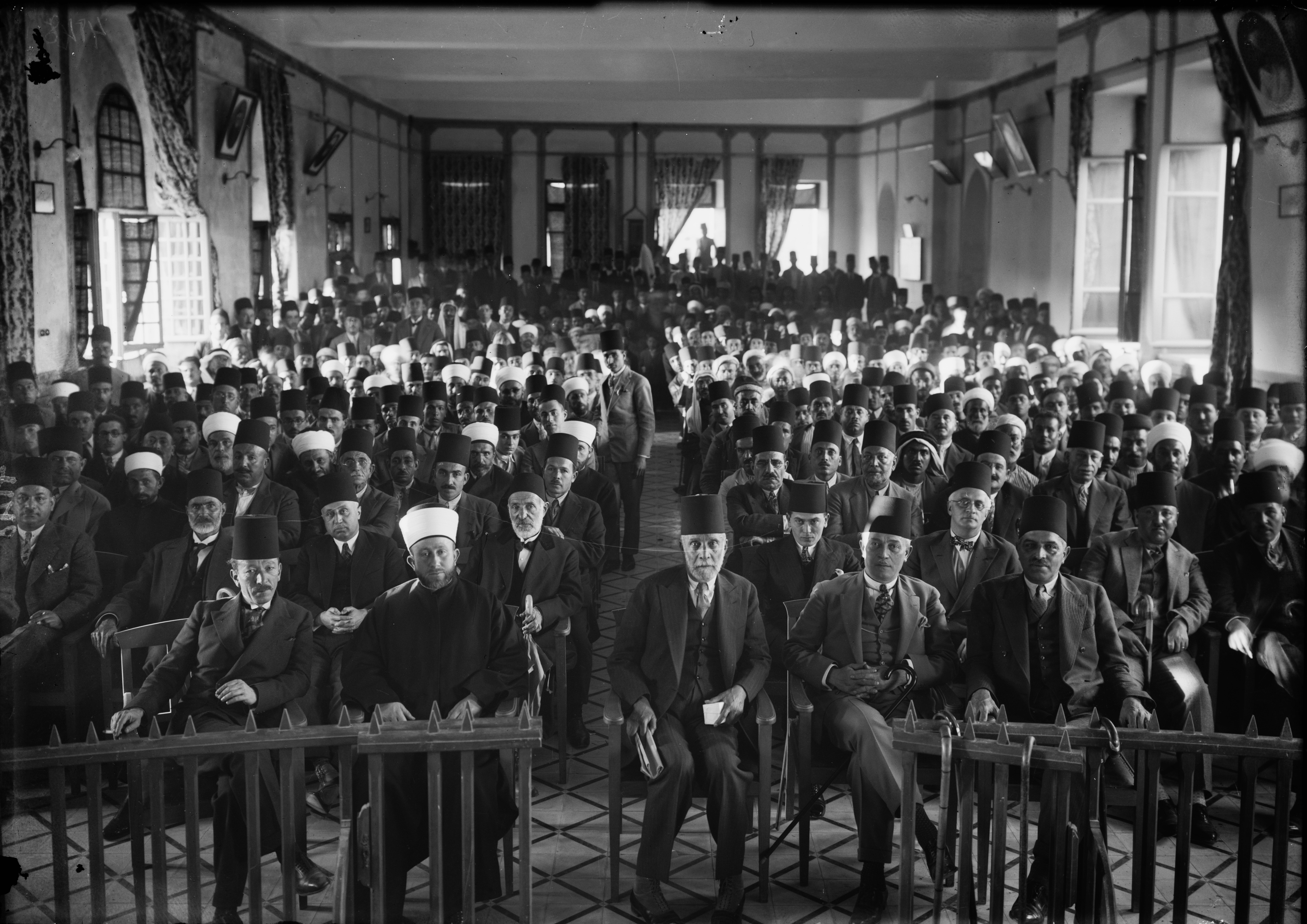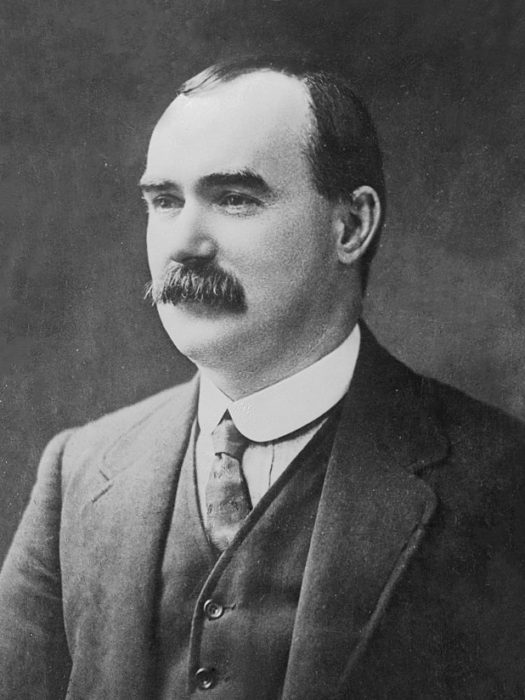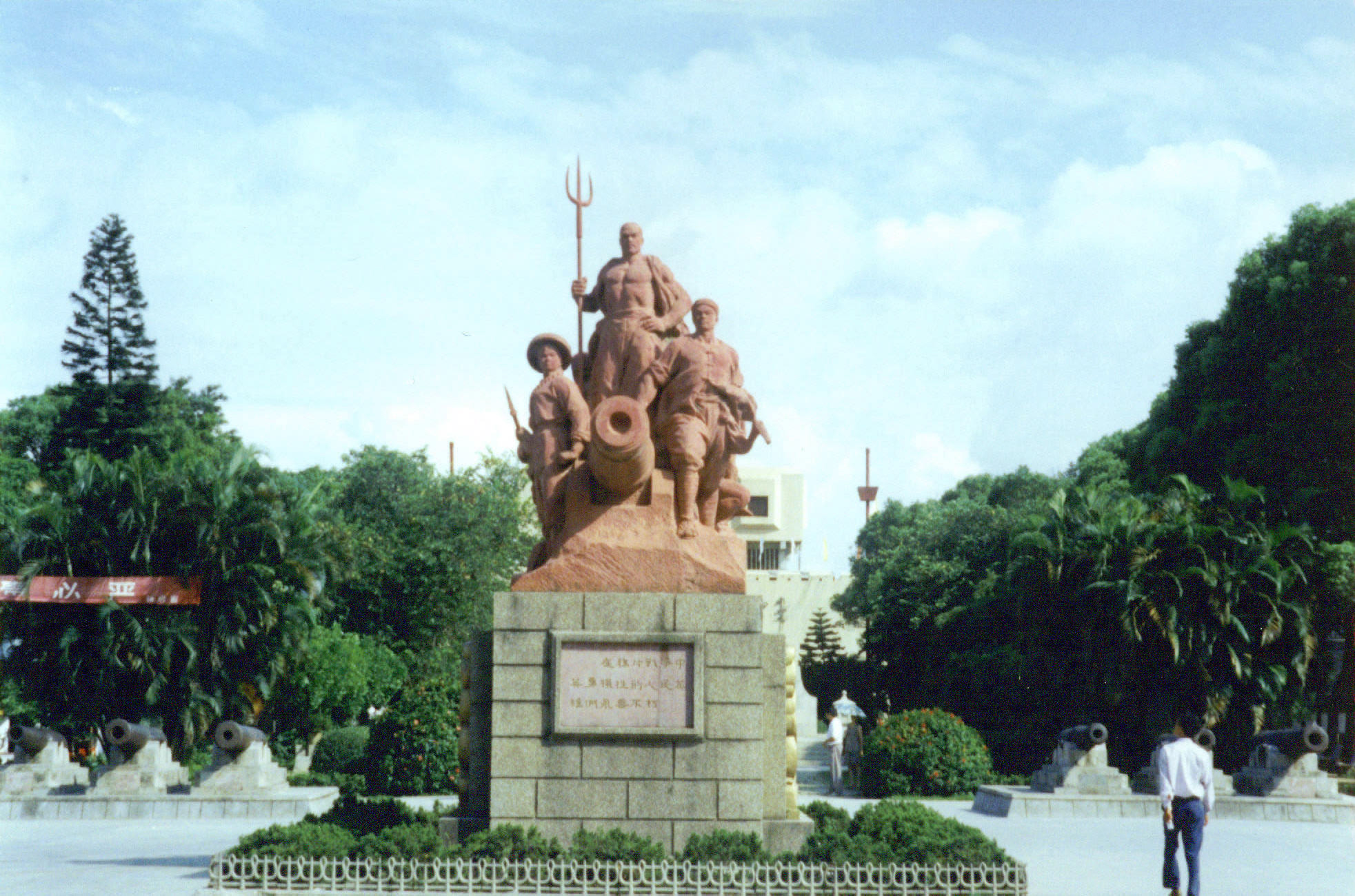From Brexit’s threat to resurrect hard borders in Ireland to the ongoing unrest in Hong Kong, John Wight reviews an array of global crises rooted in British exceptionalism.
By John Wight
in Edinburgh, Scotland
Special to Consortium News
 “Your deeds they would shame all the devils in hell,” is a line from the Ballad of James Connolly, written in 1972 by the Irish folk music band The Wolfe Tones in tribute to the Irish rebel leader, union organiser, thinker and theorist, who was executed by a British firing squad for his part in the 1916 Easter Rising in Dublin.
“Your deeds they would shame all the devils in hell,” is a line from the Ballad of James Connolly, written in 1972 by the Irish folk music band The Wolfe Tones in tribute to the Irish rebel leader, union organiser, thinker and theorist, who was executed by a British firing squad for his part in the 1916 Easter Rising in Dublin.
This lyric offers a cogent summation of the blood-soaked legacy of British colonialism and imperialism, which continues to play a role in an array of world crises.
The unrest in Hong Kong; the stand-off between India and Pakistan over Kashmir; the unremitting suffering of the Palestinians; tensions with Spain over Gibraltar; the ongoing diplomatic dispute with Argentina over the sovereignty of Las Malvinas (Falkland Islands) that spawned a 10-week war in 1982; the seemingly intractable hostility between Turkey and Greece over Cyprus; and on a wider level the unending factional, tribal and religious strife across the Middle East, the origin of which can be traced to the region’s carve up under the auspices of the Sykes-Picot Agreement (1916) between London and Paris. And let us not forget either the problems that have beset Zimbabwe and Sudan in Africa, former British colonies whose present strife is inextricably linked to their colonial past.

An Arab protest gathering against British policy in Palestine, 1929. (Wikimedia Commons)
Whither a United Ireland?
Much closer to London is the Irish question: the one for which James Connolly sacrificed his life, as did countless others before and after him.
The most insurmountable aspect of the ongoing Brexit crisis revolves around the issue of the Irish border – more specifically the danger of a resumption of violence in the province if anything like a hard border is reintroduced between North and South. This could occur if Northern Ireland, as part of the U.K., leaves the EU while the South, an EU member stays in. [On Thursday the Tory government reached a tentative deal with the EU, which Parliament must now approve, to allow Northern Ireland to maintain its current relationship with Europe for four years, keeping the border open.]
Please Consider Making a Donation to Our Fall Fund Drive.
The burning question is not whether the border between both entities will stay frictionless and open, as per the 1998 Good Friday Agreement (GFA), or whether a hard border will be reintroduced, as is certain if the hard Brexit which Prime Minister Boris Johnson and his Bannonite acolytes favor comes to pass [pending Parliament’s action on the new deal]. No, the burning question is why in 2019 there remains any kind of border on the island of Ireland at all, other than to continue to appease a unionist community that is determined to continue living in the past; one rooted in Protestant/unionist ascendancy over their Catholic/nationalist neighbours?

James Connolly. (David Granville/Wikimedia Commons)
When in 1921 Michael Collins, who’d led the insurgent Irish War of Independence against the British from 1919, went to London and signed the treaty that gave birth to what became the Republic of Ireland and Northern Ireland, he effectively signed his own death warrant.
That death duly came the following year during the civil war that had broken out between the majority faction of the Irish Republican movement that supported Collins and the treaty with Britain, and the minority who were bitterly opposed and considered it a betrayal of the independent and free 32-country Irish republic they’d fought for, and for which many of their comrades had died, going back to 1916.
Ever since, partition has been a fierce bone of contention for those in Ireland who’ve aligned themselves with the anti-treaty sentiment of Irish republicanism that James Connolly articulated in his last statement prior to his execution:
“Believing that the British Government has no right in Ireland, never had any right in Ireland, and never can have any right in Ireland, the presence in any one generation of Irishmen of even a respectable minority ready to die to affirm that truth, makes that government forever a usurpation and a crime against human progress.”
It is why, as the clock ticks down towards Britain’s exit from the EU without a deal, among the few who will benefit will be dissident republicans in Ireland. These are people for whom the GFA was a betrayal of everything that Connolly and his comrades fought and died for, and who are itching to reassert the primacy of the gun over the ballot box.
New IRA says ’Good Friday agreement is dead’ and any Irish border is ‘legitimate target for attack’ https://t.co/rjcAMPalzK via @theirishpost
— SteK The Red #GTTO# (@Red_SteK) October 17, 2019
Hong Kong & Kashmir’s Colonial Scars
Despite being4,000 kilometers apart, Hong Kong and Kashmirbear the scars of British colonialism too.
The suggestion made by senior Conservative Party MP and former British Army officer Tom Tugendhat that the people of Hong Kong, who are engaging in violent clashes with the police, should be granted full U.K. nationality as a form of protection from Beijing provided the world with an insight into the arrogance of the British colonial mind.
In making it, Tugendhat was standing on the ignoble shoulders of Lord George Macartney, who led Britain’s first trade delegation to China in 1792 on the orders of King George III.
Though Macartney’s first attempt to open up Beijing to the tender mercies of British “progress” met with failure in 1792, the British East India Company was enjoying more success, having just begun to export opium from India into China in significant quantity.
It was Beijing’s attempt to ban the opium trade in 1839 that sparked the first of the two Opium Wars that Britain would wage against China in the 19th century, dispatching the Royal Navy to bombard it into submission on both occasions.
As part of the 1842 Treaty of Nanjing at the end of the first Opium War, Beijing was forced to pay London a large indemnity, give up Hong Kong and continue to allow the importation of opium. It was an act of international brigandage dressed up in the pomp and ceremony of British exceptionalism, and marked the start of China’s “century of humiliation” during which the country was mercilessly exploited, mistreated and invaded by a clutch of imperialist powers; the U.K. being joined in this endeavour by the U.S., France and Japan.

Entrance of the Opium War Museum in Humen Town, Guangdong, China, 1995. (Moody75, CC BY-SA 2.0, Wikimedia Commons)
British Exceptionalism Entrenched
By the time of the Treaty of Nanjing, British exceptionalism was already entrenched across the Indian subcontinent. From 1846 to 1947 Kashmir was ruled as a princely state by the British Raj in India, reducing it to a British vassal.
At the point of Britain’s withdrawal from India in 1947, after first organising the country’s partition into the new Muslim majority state of Pakistan and Hindu-dominated India, Labour’s Clement Attlee was prime minister. In words that do much to discredit his legacy, he served up a speech in the House of Commons that included the following:
“Looking back today over the years, we may well be proud of the work which our fellow citizens have done in India. There have, of course, been mistakes, there have been failures, but we can assert that our rule in India will stand comparison with that of any other nation which has been charged with the ruling of a people so different from themselves.”
Here we can only surmise that Attlee was suffering from historical amnesia, responsible for him gliding over such British atrocities as the response to the Indian Mutiny of 1857, which involved captured rebels being tied to the ends of British army cannons and blown to smithereens.
And while, at the point of Attlee’s speech in 1947, this grim episode could be said to have been lost in the mists of time, the Amritsar Massacre of 1919, when British troops killed 400 people protesting British rule, could not. And if Amritsar wasn’t enough to stir any residual guilt in the breast of Attlee on behalf of the British state, what about the Bengal Famine of 1943, just four years earlier, in which 3 million died due to the actions, or rather inaction, of Attlee’s predecessor Winston Churchill?
The partition of India by the British in 1947 resulted in appalling communal slaughter, entrenching the decades of enmity that have existed between India and Pakistan since, with Kashmir being claimed by both nations. “In 1948 the then-ruler of the princely state of Jammu and Kashmir, Maharaja Hari Singh, who was holding out for independence, acceded to India on condition that the state retain autonomy in all matters except defense, currency and foreign affairs,” reports Human Rights Watch. But in August of this year India unilaterally revoked that autonomy, sent the army in, cut off communications and set a curfew, creating the current crisis built on the legacy of British partition.
At least David Cameron, when he was prime minister, had the decency to apologize for Britain’s egregious legacy in India and its role in the intractable dispute over Kashmir. This he did while on official visit to Pakistan and was asked what should be done about the Indian administered region: “I don’t want to try to insert Britain in some leading role where, as with so many of the world’s problems, we are responsible for the issue in the first place,” he said.
It’s just a pity Cameron didn’t hold that thought when it came to his push for Western military intervention in Libya the same year. But that’s another story.
Overall, then, many of the multiple crises that plague our world, the three explored above and the others that have been midwifed into existence by Britain, make a compelling case not for London’s interference in global affairs but rather reparations for its history and legacy of colonial and imperial crimes.
But, then, as the African proverb has it: “Until lions have their own historians, the history of the hunt will always glorify the hunter.”
John Wight is an independent journalist based in Edinburgh, Scotland.
If you value this original article, please consider making a donation to Consortium News so we can bring you more stories like this one.
Before commenting please read Robert Parry’s Comment Policy. Allegations unsupported by facts, gross or misleading factual errors and ad hominem attacks, and abusive or rude language toward other commenters or our writers will be removed. If your comment does not immediately appear, please be patient as it is manually reviewed. For security reasons, please refrain from inserting links in your comments.
Please Consider Making a Donation to Our Fall Fund Drive.

Thanks for this piece. I’m British but haven’t lived there in nearly 30 years but I’ve wanted to read some articles about British imperialism. This was very interesting. Thanks
Thanks for the History of the British Empire we don’t find enough of.
Cecil Rhodes was a British magnate and politician for the Cape Colony in South Africa.
A vigorous supporter of settle colonialism, here is a look at some of the best Cecile Rhodes quotes from his life.
…………………………………………………………….
“Africa is still lying ready for us, it is our duty to take it. It is our duty to seize every opportunity of acquiring more territory and we should keep this one idea steadily before our eyes.”
“Ask any man what nationality he would prefer to be, and ninety nine out of a hundred will tell you that they would prefer to be Englishmen.”
“Having read the histories of other countries, I saw that expansion was everything, and that the world’s surface being limited, the great object of present humanity should be to take as much of the world as it possibly could.”
“I contend that we are the finest race in the world and that the more of the world we inhabit, the better it is for the human race.”
“I have found out one thing and that is, if you have an idea, and it is a good idea, if you only stick to it you will come out all right.”
“I have too much work on my hands and I would not be a dutiful husband.”
“If there be a God, I think he would like me to paint Africa British-Red as possible.”
“In order to save the forty million inhabitants of the United Kingdom from a bloody civil war, our colonial statesmen must acquire new lands for settling the surplus population of this country, to provide new markets…”
The seemingly intractable hostility between Turkey and Greece over Cyprus that the author attributes to British colonialism is actually the result of Turkish colonialism.
Rhodes wanted to expand the British Empire because he believed that the Anglo-Saxon race was destined to greatness.
In his last will and testament, Rhodes said of the English, “I contend that we are the first race in the world, and that the more of the world we inhabit the better it is for the human race. I contend that every acre added to our territory means the birth of more of the English race who otherwise would not be brought into existence.”
These views struck a chord with Adolf Hitler, who claimed that Rhodes was the only Englishman who truly understood Anglo-Saxon ideals.
(Superior Race Ideology Rules the World.— Thank You, Cecil Rhodes).
——————–
Rhodes wanted to expand the British Empire because he believed that the Anglo-Saxon race was destined to greatness.
In his last will and testament, Rhodes said of the English, “I contend that we are the first race in the world, and that the more of the world we inhabit the better it is for the human race. I contend that every acre added to our territory means the birth of more of the English race who otherwise would not be brought into existence.”
These views struck a chord with Adolf Hitler, who claimed that Rhodes was the only Englishman who truly understood Anglo-Saxon ideals.
John Chuckman
Thank you for pointing out the obvious. China`s way is that of the angels as compared to the European way of driving countries to their knees. Where the Chinese offer economic bennefits, win win strategies and non interference in internal affairs the European way of colonization was gunboat diplomacy. In short they shot their way in and killed the native population into submission. There is much the white race can learn from the Chinese way of expansion.
This not a racial issue, so no need to inject it. Empire is a disease of the mind, which has afflicted cultures for thousands of years, and it is past time to go beyond it so that nations can cooperate on the common interests of mankind, such as peace, overcoming poverty, nuclear fusion development, and space colonization. China has lifted nearly 800 million people out of poverty and credits much of its success to its assimilation to the best of the West, most notably the “American System” of economics created by Hamilton, Lincoln and FDR.
As much as I love ol’ mother England, it appears the instigator/ guilty cause of many of the current issues that plague the US. I do not think its people are guilty, just the security services and parts of the government. Financial as well as covert enterprises. Well done to John Wight.
Colonialism and imperialism are necessarily associated with the fostering of exceptionalism.
It cannot be otherwise.
The ugly reality glares at us from Washington.
It is interesting that Britain, not really a rising or a dominant power, is experiencing a bit of a revival of what so prevailed in the Victorian Age.
It has a lot to do, I think, with a feeling of having been bestowed a little measure of specialness by those in Washington, people who like a bit of company in their innumerable misdeeds.
Kind of second-hand exceptionalism?
The British are the base for many of these, and other, country’s issues and the US is the reason that most of these issues cannot or will not be solved.
The English ruling class has refused to accept the BREXIT plebiscite for over 3 years.
” The Tory government reached a tentative deal with the EU, which Parliament must now approve, to allow Northern Ireland to maintain its current relationship with Europe for four years, keeping the border open”. Americans are offspring of the English and our ruling class too makes up the rules and breaks treaties as it sees fit. Four years is just another point for kicking the can down the road.
Given the history of the Empire, it will only be fitting that England loses Scotland and Northern Ireland to independence in some bureaucratic nightmare with lots of Kashmir-like armed borders and with gunboats patrolling the coasts of their neighbors. Their Rich can wander the Earth with Global Neoliberal passports, and London can devolve back to what it was in the parasitic glory days of British Empire hegemony.
Sorry, have to disagree about HK. Tugendhat’s proposal is obviously fanciful from ALL viewpoints (Peking would have apoplexy, the average Brit too) but it doesn’t reflect “the arrogance of the British colonial mind”. The UK had a 99-year lease, now expired, and worked out a 50-year transition period, an agreement which Peking is busily chiselling away at, i.e. Violating.
Peking is where totalitarianism resides, and if you or I were HKers we’d both be out there “engaging in violent clashes with the police”. (Hey, the mother of my godson’s mother — old enough to remember starved corpses littering the streets during the Japanese occcupation — is One Of Those Protestors. Kindly cut this nonsense about overwhelming violence. It simply ain’t true.)
Peking is the New Imperialist. Look at it literally constructing islands in the South China Sea to deprive countries like Viet Nam and Philippines — both closer — of the oil and gas out there. Bullies. When VN overthrew the Khmers Rouges, what did China do? Invade VN, that’s what. And got it’s imperialist butt kicked.
You’re largely right about British imperialism. But you’re looking at the present through the wrong end of a telescope.
Sorry, but that’s pretty much nonsense.
Beijing isn’t at war anywhere.
It isn’t dropping bombs on half a dozen nations.
It isn’t pushing coups the way the US does in Venezuela or Ukraine.
It isn’t madly sanctioning the world with laws that should apply to only Americans.
It isn’t attacking every worthy world organization, as the US is attacking the UN and ICC and many others.
It doesn’t high-handedly tear up valid working treaties that affect the vital interests of many other states.
It’s winning over hearts and minds through brilliant projects that will literally alter the world’s economic geography.
Beijing competes instead of dominating.
Beijing cooperates instead of telling everyone that it alone is right.
Beijing negotiates instead of demanding.
And you don’t hear bellowing and name-calling and constant threats from Beijing.
AS remarkable a difference as you can find on the planet
Don’t forget the blood-drenched legacies of the Balfour Declaration and the British Mandate for Palestine in the Nakba and the resulting oppressive, murderous, apartheid state of Israel.
Quite insightful and historical piece of writing. I only wish it counted my dear country, Nigeria, among the historical crises spots created by Britain.
The analysis raised issues which are often conveniently forgotten by the British politicians and the international community.
But it is important to see the problem in full perspective. What we have is less a series of problems created by the British as such as it is the (inevitable?) consequences of the development of capitalism. If it assumed the British national character it could only have been that Britain was the premier capitalist country. This is not to absolve it of any responsibility, after all the Bristish reaped the benefit of being pioneers: that is what built and sustains its modern economy. But it helps to understand the seemingly inferior roles of other European countries as well as the United states and Japan.
A fine piece of polemic – if I may say – but no point IMHO in flogging a dead horse. The British Empire, apart from some would-be Lawrence of Arabias in the security services, is long since dead.
The real exceptionalism was to be seen in the first part of the nineteenth century, and resulted in the First Afghan War and the first Indian War of Independence (“Indian Mutiny”) The Srinagar massacre was not policy, it was the result of putting the incompetent idiot Dyer in command of anything larger than a guardhouse.
The question to which we will never know the answer is why Kashmir, with its large Muslim majority, was awarded at Partition to India, rather than Pakistan, which would have been logical.
Montreal – – – – A fine piece of polemic – if I may say – but no point IMHO in flogging a dead horse. The British Empire, apart from some would-be Lawrence of Arabias in the security services, is long since dead.
[are you sure, Montreal???]
“We must find new lands from which we can easily obtain raw materials and at the same time exploit the cheap slave labor that is available from the natives of the colonies. The colonies would also provide a dumping ground for the surplus goods produced in our factories.” — Cecil Rhodes
“Why should we not form a secret society with but one object, the furtherance of the British Empire and the bringing of the whole world under British rule, for the recovery of the United States, for making the Anglo Saxon race but one Empire? What a dream, but yet it is probable; it is possible.” — Cecil Rhodes
“Having read the histories of other countries, I saw that expansion was everything, and that the world’s surface being limited, the great object of present humanity should be to take as much of the world as it possibly could.” — Cecil Rhodes
“Remember that you are an Englishman, and have consequently won first prize in the lottery of life.” —Cecil Rhodes